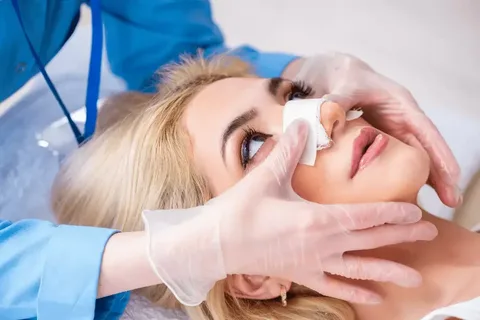Preparing for cosmetic surgery can be both exciting and nerve-wracking, especially if you’re undergoing Rhinoplasty in Islamabad. To ensure a smooth and stress-free experience, it’s crucial to know what to bring with you on the day of your procedure. The right preparation can ease anxiety, enhance comfort, and support a better recovery process.
In this detailed guide, we’ll walk you through everything you need to pack and prepare for the big day—from essential documents and clothing to medications and personal care items. Whether it’s your first cosmetic procedure or not, this checklist will ensure you arrive fully prepared.
1. Identification and Necessary Paperwork
On the day of your rhinoplasty, bring all required identification and documents. These may include:
-
Valid ID card or passport – Needed for check-in and verification.
-
Insurance documents – If your procedure is partially or fully covered.
-
Consent forms – If not submitted earlier.
-
Payment receipts or deposit slips – Especially if you’ve pre-paid or made a deposit.
-
Medical records – Any previous diagnostic tests, allergy lists, or chronic condition details.
Having these documents in a folder can help avoid last-minute panic and speed up the pre-operative formalities.
2. Comfortable, Loose-Fitting Clothing
Post-surgery, your nose and face will be delicate and possibly bandaged, so wearing the right outfit is important.
-
Front-button shirt or zip-up jacket – Avoid anything that pulls over your head.
-
Soft pants or leggings – Comfort is key; avoid tight clothing.
-
Flat, slip-on shoes – You’ll want to avoid bending down to tie laces after surgery.
The goal is to minimize movement around the face when dressing and undressing.
3. Approved Medications
Talk to your surgeon in advance about which medications are allowed on the day of surgery. You may be instructed to bring:
-
Prescribed medication – Especially if you’re on long-term treatment like thyroid medicine or blood pressure control.
-
Post-op pain relievers or antibiotics – Sometimes provided in advance by the clinic.
-
List of current medications – Including supplements and over-the-counter drugs.
Never take any medication without prior approval, as some may interfere with anesthesia or increase bleeding risk.
4. Personal Hygiene and Skincare Essentials
While the clinic may provide basic toiletries, bringing your own essentials can help you feel more at ease.
-
Facial wipes – Since you won’t be able to wash your face directly after surgery.
-
Lip balm – General anesthesia often leads to dry lips.
-
Hair tie or headband – To keep your hair away from your face.
-
Toothbrush and toothpaste – Useful for overnight stays.
-
Deodorant (unscented) – Avoid anything heavily fragranced.
Refrain from wearing makeup, perfume, or lotion on the day of surgery, especially near the face.
5. Snacks and Water (If Permitted)
Most rhinoplasty surgeries require fasting, so you’ll likely be asked not to eat or drink anything for 6–12 hours prior. However, after surgery:
-
Light, non-greasy snacks like crackers or fruit juice may help after anesthesia wears off.
-
Bottled water – Good to have on hand if permitted.
Always follow your clinic’s guidelines about food and drink before and after your procedure.
6. Entertainment and Comfort Items
You may spend a few hours at the clinic before heading home. To pass the time and ease anxiety, consider packing:
-
Books or magazines – Distraction helps with pre-surgery nerves.
-
Headphones and playlist – Listening to calming music can reduce stress.
-
Mobile phone and charger – To stay connected with family or caregivers.
These items can also be helpful during the early recovery phase when you’re mostly resting.
7. Caregiver or Companion Essentials
In most cases, patients are not allowed to drive themselves home after surgery. It’s wise to bring:
-
A responsible adult – Someone to escort you back home safely.
-
Snacks and water for them – They might be waiting for several hours.
-
Phone numbers and directions – In case they need assistance or updates.
Choosing a calm and supportive companion can make a big difference in how you feel post-surgery.
8. Recovery Aids for Immediate Use
You’ll want to feel as comfortable as possible on the ride home and during the first few hours of recovery.
-
Neck pillow – Keeps your head elevated during rest or travel.
-
Small pillow or cushion – For added back support.
-
Blanket or shawl – Post-surgery chills are common.
-
Face mask (loose-fitting) – Optional but helpful in public settings.
Many patients report that planning for post-op comfort helps them manage the initial recovery period much better.
9. Emergency Contact List
Have a written list of emergency numbers, including:
-
Surgeon’s contact information
-
Nearest family member or friend
-
Primary care physician
-
Emergency services
Don’t rely solely on your mobile device—keep a printed copy in your personal bag.
10. Positive Mindset and Patience
Finally, the most important thing to bring is a calm and positive outlook. Trust your decision, your surgeon, and the healing process.
-
Remind yourself why you’re doing this.
-
Remember that swelling and bruising are temporary.
-
Know that your results will take time to fully appear.
Mental preparation plays a huge role in how well patients cope with the post-surgical phase.
Final Thoughts
Being well-prepared for the day of your Rhinoplasty in Islamabad can significantly improve your overall experience. By packing the right items and knowing what to expect, you reduce stress and allow yourself to focus on recovery. Every detail counts—from the clothes you wear to the support you have with you. Don’t underestimate the power of preparation.
If you’re considering rhinoplasty or already have a date set, follow this checklist to ensure nothing important is left behind. Always consult with your surgeon or clinic for personalized advice before the big day.
